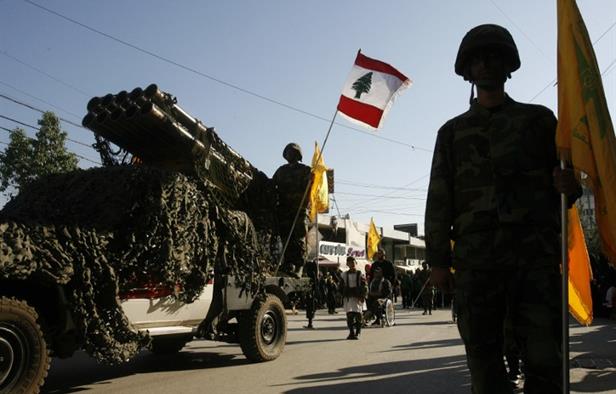Lebanon the militia state
Tony Badran/Now Lebanon
Published: 18/12/2014
In Baghdad as in Beirut, the US has consented to this pro-Iranian set-up under the pretext of combating terrorism
During his recent visit to Beirut, Deputy Assistant Secretary of Defense Matthew Spence reportedly told Lebanese officials that “the war on terror has created a new reality, which has allowed the state to expand its influence at the expense of Hezbollah’s influence.” This contention is becoming something of a conventional wisdom. Lebanese MP Bassem Shabb made the same case in a recent article. The truth, however, is that Hezbollah has broken down the state and all its institutions.
Nowhere is this more evident than in the case of the Lebanese Armed Forces (LAF) soldiers held by Jabhat al-Nusra in Syria. Last week, after Qatar withdrew its mediation effort to release of the soldiers, the Association of Muslim Scholars stepped into its place. However, its efforts were immediately sabotaged when none other than the LAF Directorate of Intelligence (DI), which is very close to Hezbollah, apprehended the sister-in-law of a commander of a franchise of the Islamic State (ISIS), exacerbating an already tense situation. This effectively killed the Association’s mediation efforts. This begs the question: why would the DI seek to undermine efforts to release fellow LAF soldiers? The answer is that Hezbollah, which dominates the state, has other ideas.
From the beginning of the episode, Hezbollah has made it clear that it opposes a government-negotiated release of the captives — even as it has pursued that course of action itself to secure the release of one of its fighters. Instead, it has pushed for escalation and for the LAF to enter into open confrontation with Syrian rebel groups.
Back in September, not long after the soldiers were captured, Hezbollah mouthpiece Ibrahim al-Amin penned an editorial that laid out the group’s objectives. Amin pushed two themes: the LAF should launch a wide-ranging war against the Syrian armed groups in Arsal and elsewhere. But, he reasoned, the LAF is not capable of prosecuting such a war by itself, and as such needs to work hand-in-hand with the Syrian regime and Hezbollah.
Since then, Hezbollah, its allies and affiliated media have hammered incessantly on these two talking points. Since the US announced the coalition to fight ISIS, it’s been a constant refrain of the Iranian camp that the Assad regime should be an interlocutor, if not a member, of the coalition.
Jamil al-Sayyed, one of the Assad regime’s most notorious henchmen in Lebanon, offered the latest installment in this thread. In an interview on Monday, Sayyed revealed that the Assad regime had proposed giving the armed factions in Qalamoun safe passage to the Syrian interior in return for the release of the captive soldiers. This corridor would be under the supervision of the UN, and, Sayyed added, the LAF would be given Saudi and American cover “to close the open wound between Lebanon and Syria,” in reference to Arsal and its hinterland into Qalamoun.
In other words, the Assad regime, like Hezbollah, wants to piggyback on the LAF. Assad understands that the LAF enjoys full US backing, so if he can’t get into the room with the Americans through the front door, he’ll try to sneak in through the LAF’s window.
Assad’s gambit didn’t work. Hezbollah’s game with the LAF, however, continues. For one, the Shiite militia has more or less successfully pushed the LAF into its war with the Syrian rebels. Last week, the LAF shelled Arsal’s outback and blocked most roads to the area. And while the Army command talks with bravado about going after terrorists, the LAF, and the DI in particular, have been rampaging against Syrian refugee camps and arresting people left and right, often keeping them in unlawful detention.
For Hezbollah, the fate of the soldiers matters little. The situation represents an opportunity it is utilizing to the fullest. It opens a way to keep the Sunnis in a corner, having to sit and watch Hezbollah work hand in glove with the LAF but unable to speak against the LAF, lest they are accused of supporting terrorism.
For its part, the LAF is playing along willfully. The thing is — the LAF knows it can get away with all this because of the international, specifically American, support it enjoys as a partner in the fight against terrorism. It can have it both ways: it can do Hezbollah’s bidding and still get international support, without worrying about pushback from the Sunni political establishment.
And so, Spence’s reported admonition that “the LAF cannot deal with Hezbollah as a partner,” is disingenuous. The Obama administration knows full well that that’s precisely the reality in Lebanon, just as it knows it to be the case in Iraq with the Shiite militias and the Iraqi Security Forces. In Baghdad as in Beirut, the US has consented to this pro-Iranian set-up under the pretext of combating terrorism.
The LAF is not safeguarding the expansion of state authority at Hezbollah’s expense. If anything, it is servicing what NOW colleague Elie Fawaz has dubbed “the militia state.” As it pursues rapprochement with Iran, the Obama White House is effectively sanctioning this model of state institutions, namely national armies and security forces, integrated with Iranian-run militias.
**Tony Badran is a research fellow at the Foundation for Defense of Democracies. He tweets @AcrossTheBay.






















